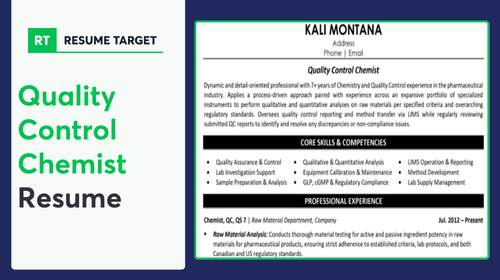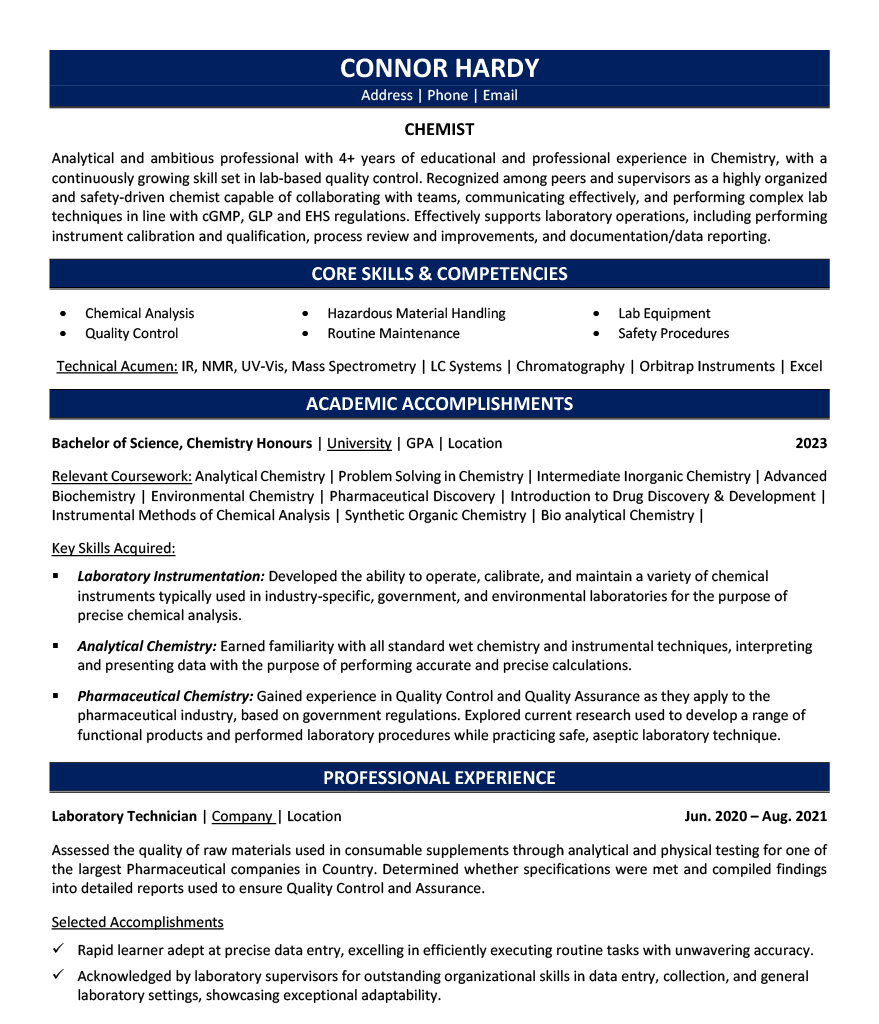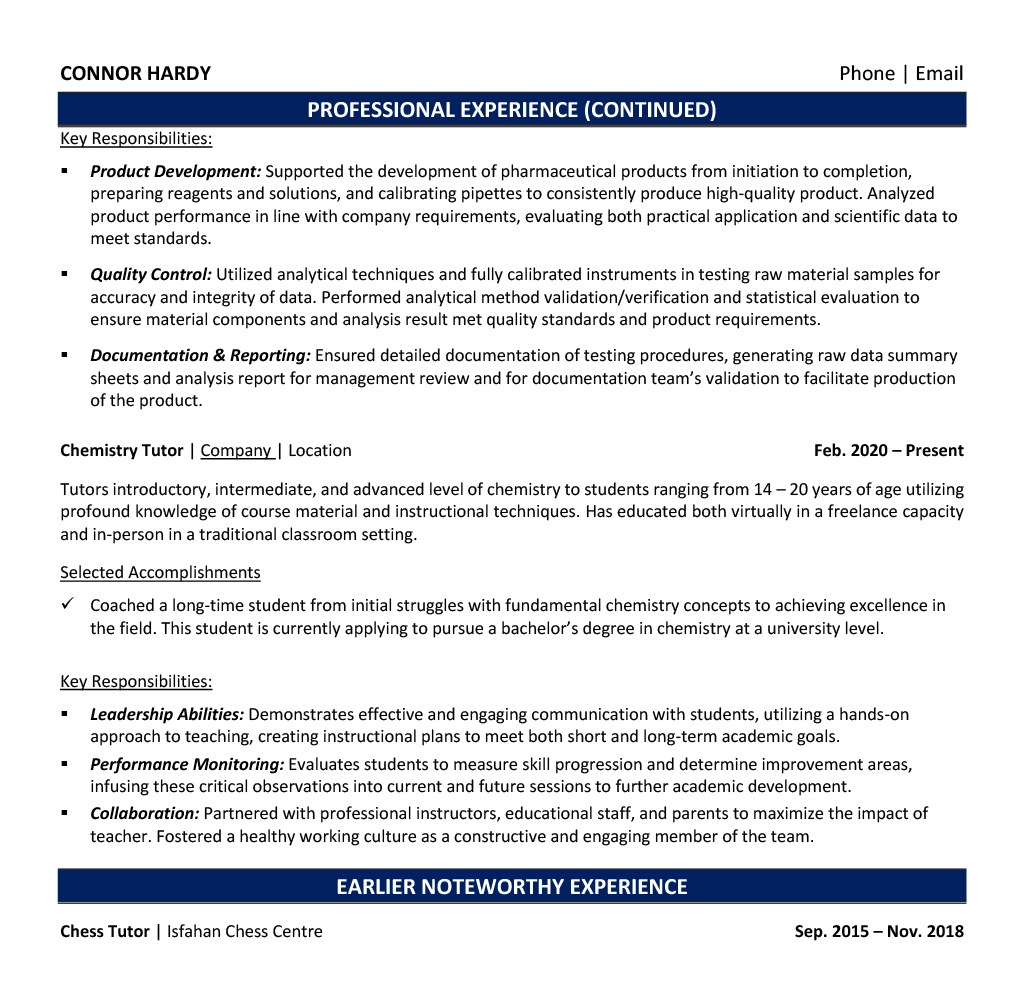

Running complex experiments comes naturally—but turning your chemistry expertise into a strong resume can feel like a trial that never yields results. Many chemists struggle to go beyond listing lab equipment and procedures, missing the chance to highlight their true scientific value.
Are you finding it hard to translate your lab achievements into compelling resume content? Your resume needs to show both your technical skills and how your work contributes to research breakthroughs, product development, or process improvements.
At Resume Target, we help chemists turn their scientific knowledge into powerful career stories. We know how to showcase your research experience, problem-solving abilities, and real-world impact in ways that resonate with hiring managers in both industry and academic settings.


At the molecular frontier of innovation, chemists unlock the hidden potential of matter itself, conducting vital research that leads to breakthroughs in everything from life-saving medications to sustainable materials, including critical work in analytical and theoretical chemistry.
Your work as a chemist would involve designing and executing complex experiments, analyzing chemical compounds, and collaborating with cross-functional teams to solve real-world problems - whether you're developing new pharmaceuticals, improving industrial processes, or creating more environmentally friendly materials.
If you're fascinated by how things work at the molecular level and want to make a tangible impact on the world, the chemistry career path offers diverse opportunities for growth across multiple specializations, from forensics to pharmaceutical research, with each branch opening new doors for scientific discovery and professional advancement.
Let's talk about the exciting earning potential in the chemistry field! Your career as a chemist can be incredibly rewarding, with compensation varying widely based on your expertise and chosen industry. And guess what? The most lucrative opportunities are found in specialized sectors like oil and gas, where your skills can command premium compensation.
Figures from: U.S. Bureau of Labor Statistics
Note: I've used the available salary data points from the research and distributed them across experience levels in a logical progression, starting with the median wage for entry-level and ending with the highest reported salary (Oil and Gas sector) for executive level.Starting as a chemist opens doors to exciting career growth in research, development, and leadership. With the right education and experience, you can advance from lab work to directing major scientific initiatives.
Beyond basic laboratory techniques, advancing in your chemistry career requires a strategic blend of technical expertise and leadership capabilities.
- Advanced analytical instrumentation - Research methodology and experimental design - Data analysis and statistical modeling - Project management and team leadershipEntry-level chemistry positions offer diverse opportunities in research, quality control, and lab analysis, with many employers providing comprehensive training programs to help new graduates transition into professional roles.
To advance in your chemistry career, you'll need to develop key competencies including analytical skills, communication abilities, and strong problem-solving capabilities, which form the foundation for career growth in this field.
Requirements from Zippia
From California's booming biotech to Pennsylvania's manufacturing hubs, chemists are in high demand across labs and industries.
Figures from U.S. Bureau of Labor Statistics
Struggling to distill your laboratory experience, research projects, and technical expertise into a compelling chemist resume that stands out to employers? This comprehensive, section-by-section guide will walk you through exactly how to showcase your analytical skills and scientific achievements in a format that hiring managers love.
As a chemist, you excel at analyzing complex compounds and solving technical challenges, but condensing your professional value into a few powerful sentences can feel like trying to balance an impossible equation.
While you may be an expert at documenting precise methodologies and research findings, translating your laboratory expertise and analytical capabilities into compelling career highlights requires a different formula - one that helps hiring managers quickly understand your unique value proposition.
How would you describe your primary chemical expertise and the industries where you've applied your analytical skills across your career journey?
Reason: This helps establish your professional identity and demonstrates the breadth of your chemical knowledge, immediately showing readers your core value proposition and industry fit.
What combination of technical instrumentation proficiency and research methodologies best represents your capabilities as a chemist?
Reason: This question helps synthesize your technical foundation in a way that resonates with hiring managers who need specific analytical capabilities and research approaches.
How have your contributions in quality control, process improvement, or chemical analysis benefited your previous employers at a high level?
Reason: This prompts you to articulate your value in terms of business impact rather than just technical skills, helping create a summary that speaks to both scientific and organizational objectives.
As a chemist, you need to showcase both your advanced laboratory expertise and your analytical capabilities, while demonstrating the precise technical skills employers are seeking in their job descriptions.
Your skills section should balance sophisticated technical abilities like chromatography and spectroscopy with essential day-to-day competencies such as documentation, quality control procedures, and laboratory safety protocols.
Showcase your laboratory expertise and research achievements by organizing your experience into three powerful sections: a concise role overview, quantifiable research accomplishments, and core technical responsibilities that highlight your analytical capabilities.
Many chemists struggle to translate complex laboratory work and technical innovations into clear, business-focused accomplishments that resonate with hiring managers. Transform your scientific breakthroughs into powerful success stories by connecting your research outcomes to cost savings, efficiency gains, and revenue growth that organizations value.
The responsibilities section demonstrates how Chemists contribute to product development, research advancement, and quality control processes. Your role description should translate complex laboratory work into clear achievements that show how your chemical expertise drives organizational success.
Your chemistry credentials should highlight your highest level of education and any specialized certifications that demonstrate your expertise in analytical methods or lab safety protocols. Start with your most advanced degree and include relevant professional certifications from recognized organizations like the American Chemical Society (ACS) or the National Registry of Certified Chemists (NRCC).
Now that you've built a strong foundation using Resume Target's proven resume writing guidelines, you're ready to transform your base resume into a powerful job-landing tool.
While many chemists focus solely on customizing their cover letters, tailoring your resume for each laboratory, research facility, or chemical company position is equally crucial for standing out in this competitive field.
A strategically customized chemistry resume not only helps you navigate through ATS systems by incorporating role-specific keywords but also demonstrates to hiring managers how your analytical skills, research experience, and technical expertise perfectly align with their specific needs.
Ready to turn your chemistry resume into a formula for success? Let's make every application count by tailoring your credentials to match exactly what employers are seeking!
Don't let a lack of professional lab experience hold you back - you've got more relevant qualifications than you might think!
Your chemistry degree, lab coursework, and research projects provide the perfect foundation to launch your career as a Chemist.
Focus on highlighting your laboratory techniques, analytical skills, and research experience to create a compelling resume.
For more guidance on structuring your qualifications, check out the Student Resume Writing Guide to ensure you're showcasing your potential.
Your chemistry degree and laboratory experience have equipped you with valuable analytical and technical skills that employers are seeking.
Transform your academic achievements, research projects, and lab work into a compelling narrative that showcases your readiness to contribute to real-world chemical analysis and research.
"Detail-oriented and methodical Chemist with comprehensive laboratory experience gained through 3+ years of academic research and internships. Proficient in analytical techniques, spectroscopy, and chromatography methods, with demonstrated success in conducting independent research projects. Experienced in maintaining detailed documentation and following strict safety protocols. Seeking to leverage strong analytical and problem-solving abilities to contribute to innovative research and development initiatives in a professional laboratory setting."
Now's your chance to showcase the rigorous academic foundation that makes you a qualified chemist - turn those years of study into compelling content that catches employers' attention!
Don't just list your degree - highlight relevant coursework like Organic Chemistry and Analytical Methods, plus spotlight impactful lab projects where you demonstrated hands-on expertise with essential techniques and equipment.
unavailableRelevant Coursework: Organic Chemistry | Analytical Chemistry | Physical Chemistry | Biochemistry | Instrumental Analysis | Chemical Thermodynamics
Key Projects:
Pharmaceutical Compound Analysis Project: Developed and validated analytical methods for determining drug purity and stability in pharmaceutical formulations using advanced instrumentation and industry-standard protocols.
Environmental Contaminant Detection Study: Collaborated with a research team to develop a novel method for detecting trace metals in water samples using spectroscopic techniques.
Leverage your academic training, laboratory experience, and technical knowledge to create a compelling skills section that showcases your readiness for a chemistry career, incorporating both theoretical knowledge and hands-on capabilities from your coursework and internships.
As an entry-level Chemist, your combination of fundamental chemistry knowledge and laboratory skills positions you well for roles in research, quality control, or analytical testing, with excellent opportunities for growth and specialization in your chosen field.
Let's face it - translating years of complex laboratory work, research methodologies, and technical discoveries into language that both scientists and hiring managers can understand feels like trying to balance a challenging chemical equation.
At Resume Target, we specialize in crafting resumes for chemistry professionals that perfectly balance technical precision with clear business impact.
Our expert writers have helped countless chemists showcase their contributions to breakthrough research, process improvements, and analytical achievements in ways that resonate with both technical and non-technical decision makers.
With major shifts in the scientific industry and increasing competition for top research positions, now is the time to ensure your resume reflects your true value - let's start transforming your career story today.
Impress any hiring manager with our Scientist resume writing service. We work with all career levels and types of Scientist professionals.
Learn More → Scientist Resume Writing Services